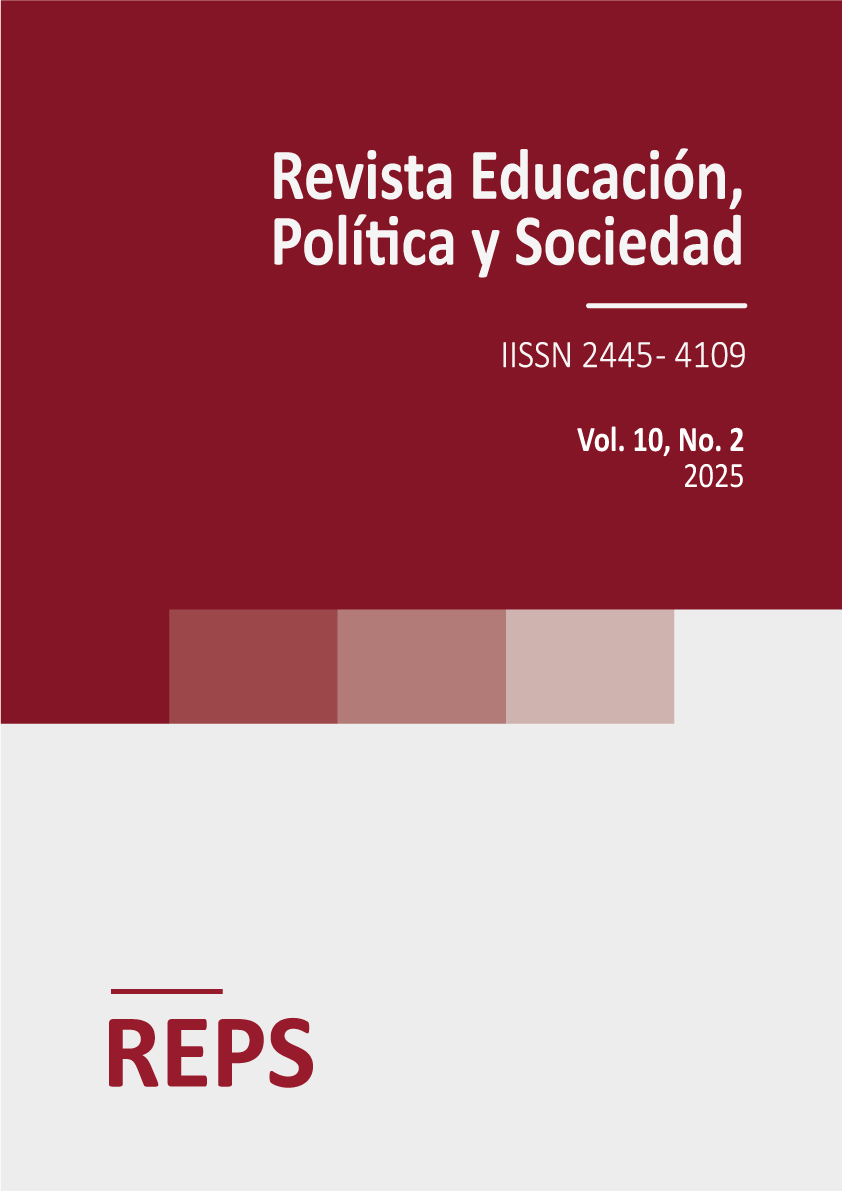La imposición del neoliberalismo en México: Resistencia y opresión del profesorado de lenguas a nivel universitario
Mots-clés :
Neoliberalismo, enseñanza de lenguas, represión, universidades mexicanas, corrupción
Cette œuvre est sous licence Creative Commons Attribution - Pas d'Utilisation Commerciale 4.0 International.
Résumé
Este estudio utiliza las ideas de Althusser (1970) sobre el aparato ideológico del Estado para examinar las trayectorias de profesores (n=4) de lenguas que enseñaron en la Meritoria Universidad de Puebla, una de las principales universidades públicas en México. A través del análisis de los testimonios de dichos participantes, el presente trabajo analiza la represión de la comunidad universitaria durante la imposición de políticas neoliberales que pretendían privatizar la educación pública y limitar el derecho a la libertad de cátedra en esta universidad. De igual forma, en este artículo se examina la opresión que los docentes de lengua han experimentado la durante las últimas 3 décadas en el sitio de estudio.
Téléchargements
Références
Ackerman, E. F. (2021). Post-neoliberalismo realmente existente en México. Política y gobierno, 28 (2), 1-8.
Althusser, L. (1971). Ideology and ideological state apparatuses (Notes towards an investigation). En L. Althusser, Lenin and philosophy and other essays (pp. 121-176). New Left Books.
Bori, P. (2018). Language textbooks in the era of neoliberalism. Routledge.
Casillas, R. (2007). Aportes de asilados y refugiados a la cultura en México a finales del siglo XX. CAAP, 159-168.
Cook, G. (2013). English language teacher education: Notes on the past and future. Linguaculture, 4 (2), 9-22. https://doi.org/10.1515/lincu-2015-0011
De Costa, P. (2019). Elite multilingualism, affect and neoliberalism. Journal of multilingual and multicultural development, 40(5), 453-460. https://doi.org/10.1080/01434632.2018.1543698
Del Persio, A. y Wong, S. (2020). Del Percio, A. y Wong, S. W. V. (2019). Resetting minds and souls: Language, employability and the making of neoliberal subjects. En L. Martín Rojo y A. Del Persio (Eds.), Language and neoliberal governmentality (pp. 190-210). Routledge.
Duque, J. F. (2023). Cambios del neoliberalismo en la educación superior chilena: el caso de la política de aseguramiento de la calidad. Revista Educación, Política y Sociedad, 8(2), 189–215. https://doi.org/10.15366/reps2023.8.2.008
Escobar, P. (2003). The new labor market: the effects of the neoliberal experiment in Chile. Latin American perspectives, 30(5), 70-78.
Flubacher, M. C. y Del Percio, A. (2017). Language, education and neoliberalism: Critical studies in sociolinguistics. En M. C. Flubacher and A. Del Percio (Eds.). Language, education and neoliberalism (pp. 1-18). Multilingual Matters.
Holborow, M. (2012). Neoliberalism, human capital and the skills agenda in higher education–the Irish case. Journal for critical education policy studies, 10(1), 93-111.
Holborow, M. (2013). Applied linguistics in the neoliberal university: Ideological keywords and social agency. Applied linguistics review, 4(2), 229-257. https://doi.org/10.1515/applirev-2013-0011
Kusow, A. M. (2003). Beyond indigenous authenticity: Reflections on the insider/outsider debate in immigration research. Symbolic Interaction, 26 (4), 591-599. https://doi.org/10.1525/si.2003.26.4.591
Latif, M. I., y Khan, R. A. (2011). Marxism in twenty first century: A critical review. Journal of educational research (1027-9776), 14(2), 65-75.
Mart?n Rojo, L. y Del Percio, A. (2019). Neoliberalism, language, and governmentality. En L. Mart?n Rojo y A. Del Percio (Eds.), Language and neoliberal governmentality (pp. 1–25). Routledge.
Martínez-Prieto, D. (2020). The ideological impact of US curricula on Mexican transnational pre-service language teachers (Doctoral dissertation, The University of Texas at San Antonio).
Martínez-Prieto, D. (2023). Ideologías y políticas de perpetua ilegitimidad: el caso de la enseñanza de lenguas en México. Archivos Analíticos de Políticas Educativas, 31(14). https://doi.org/10.14507/epaa.31.7533
Martínez-Prieto, D. (2025). Resisting neoliberalism: testimonios of language teachers as social activists. International Multilingual Research Journal, 19(1), 53-66.
Martínez?Prieto, D. y Lindahl, K. (2020). (De) legitimization: The impact of language policy on identity development in an EFL teacher. TESOL Journal, 11(3), e00514.
Martínez-Prieto, D. y Lindahl, K. (2022). National perspectives on Mexican transnational EAL teachers: Ideological and professional challenges. En R. Jain, B. Yazan y S. Canagarajah (Eds). Transnational research in English language teaching: Critical practices and identities (pp. 125 144). Routledge. https://doi.org/10.21832/9781788927482-009
Martínez-Prieto, D., Kasun, S. y Sayer, P. (2024). Los Retos and Opportunities del Transnational Translanguaging in English-Language Teaching Programs in Mexico. Bilingual Review/La Revista Bilingüe, 36(3), 55-70.
McNeil, J. M. (2022). Understanding Voice, Identity, and Navigating Contested Spaces: Dual Language Latina/o/x K–6 Teachers’ Use of Testimonios (Doctoral dissertation, UC Davis).
Novelo Urdanivia, F. (1992). La universidad pública mexicana y el neoliberalismo. Universidad Autónoma Metropolitana.
Puiggrós, A. (1996). Educación neoliberal y quiebre educativo. Nueva sociedad, 146, 90-101
Reyes, K. B. y Curry Rodríguez, J. E. (2012). Testimonio: Origins, terms, and resources. Equity y excellence in education, 45(3), 525-538. https://doi.org/10.1080/10665684.2012.698571
Saldaña, J. (2009). The coding manual for qualitative research methods. Sage
Sayer, P. (2015). “More y earlier”: Neoliberalism and primary English education in Mexican public schools. L2 journal, 7(3). https://doi.org/10.5070/L27323602
Sayer, P. (2019). The hidden curriculum of work in English language education: Neoliberalism and early English programs in public schooling. AILA Review, 32(1), 36-63. https://doi.org/10.1075/aila.00020.say
Sikes, P. (2004). Methodology, procedures and ethical concerns. Doing educational research: Aguide for first-time researchers. Sage Publications. https://doi.org/10.4135/9781446280485.n2
Takacs, D. (2002). Positionality, epistemology, and social justice in the classroom. Social Justice,29 (4), 168-181.
Torres, C. A. (2009). Globalizations and education: Collected essays on class, race, gender, and the state. Teachers college press
Zermeño, S. (1994). México, una democracia utópica: el movimiento estudiantil del 68. Siglo XXI.

